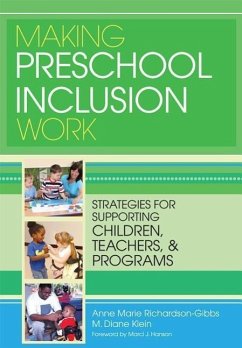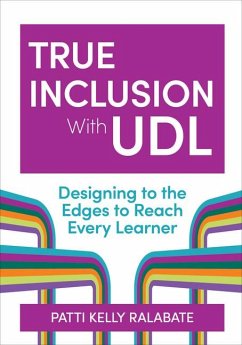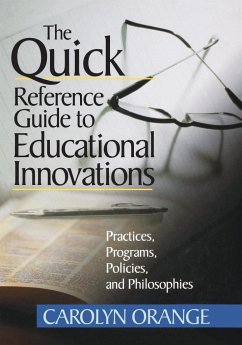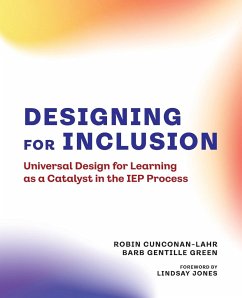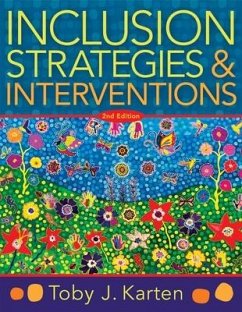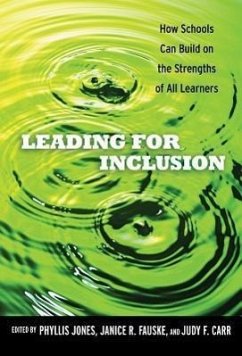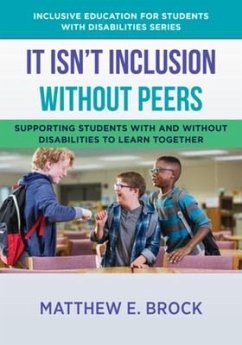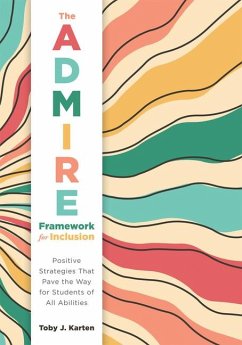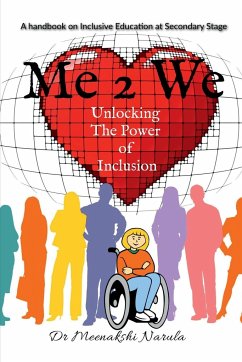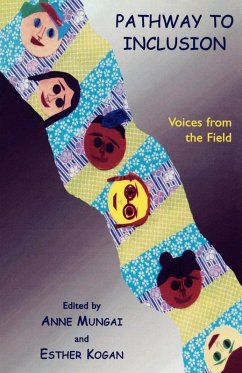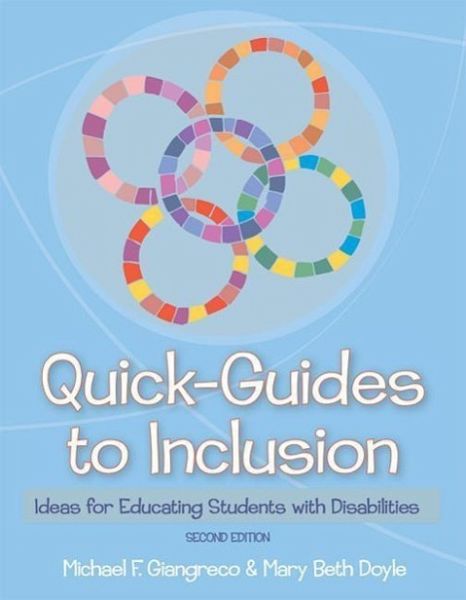
Broschiertes Buch
Quick-Guides to Inclusion
Ideas for Educating Students with Disabilities, Second Edition
Herausgeber: Giangreco, Michael; Doyle, Mary Beth
Versandkostenfrei!
Versandfertig in über 4 Wochen

PAYBACK Punkte
19 °P sammeln!




A must for busy K--12 teachers who need fast, friendly, and practical guidance on fully including students with disabilities in general education classrooms, this photocopiable sourcebook offers 23 Quick-Guides on facilitating inclusion. Each reader-friendly Quick-Guide focuses on a key issue in inclusion--such as literacy, partnerships with parents, positive behavior support, and curriculum adaptations--and gives teachers easy-to-follow ideas, examples, and tips they can put to use immediately in any classroom and on any budget.
> Mary Beth Doyle, Ph.D., works for the Vermont Department of Education as Project Coordinator of Vermont's Higher Education Collaborative to increase the number of licensed special education teachers available to the state's public schools. This project is aimed at providing field-based access to higher education for teachers in rural communities around the state. A unique aspect of this project is the partnerships that have been established among the University of Vermont, Castleton State College, Johnson State College, Lyndon State College, and St. Michael's College. These higher education institutions are working together with the state Department of Education and school districts on the design and delivery of instruction as well as administrative issues to create a strategic approach to issues of limited access to higher education for teachers around the state. The majority of Mary Beth's work has focused on creating positive learning communities for all children in which adults create a sense of welcome. To this end, Mary Beth's writing and training activities focus on issues of curriculum adaptations, paraprofessional teaming, and collaboration. Linda Davern, M.S., is a doctoral student in the Division of Special Education and Rehabilitation at Syracuse University. Her past positions include that of research assistant with the Syracuse Curriculum Project, public school teacher, and adult service worker. Her primary research interest is focused on integration efforts in public schools. June E. Downing, Ph.D., was a national leader in the field of special education who focused her expertise, time, and energy researching best practices and advocating for individuals with severe and multiple disabilities. She was a steadfast promoter of inclusive education, viewing access to the general education program and peers without disabilities as best practice, as well as an issue of social equality and civil rights. Dr. Downing was an exceptionally productive scholar who published numerous articles, chapters, monographs, and textbooks focusing on the education and inclusion of students with severe and multiple disabilities. Her publications are used by many educators and parents to learn how to provide quality education in inclusive classrooms to students with severe and multiple disabilities. Dr. Downing provided numerous professional development trainings in many regions of the world and served as the keynote speaker at several national and international conferences. She was known for her practical, invigorating, and humorous presentations and workshops. Dr. Downing's career in the field of special education began as a teacher of students with visual impairments and multiple disabilities including deafblindness. She was Associate Professor at the University of Arizona in Tucson and Professor at California State University, Northridge (CSUN). She directed or codirected several federally funded personnel preparation, research-to-practice, and technical assistance projects and was committed to preparing exceptional, highly qualified teachers, whose role she saw as change agents for the future. Through Dr. Downing's teaching and hands-on guidance, her students developed a passion for teaching and a strong commitment to supporting quality lives for students with disabilities and their families. While at CSUN, Dr. Downing contributed to the development of the CHIME Institute's Charter School and was instrumental in its high-quality inclusive educational practices. Dr. Downing served on the National TASH Board of Directors for six years and was Past President of Cal-TASH and AZ-TASH (the California and Arizona state chapters of TASH). She also served as an associate editor of Research and Practices for Persons with Severe Disabilities. Dr. Downing retired from CSUN in 2007 and returned to Tucson, where she lived until her death in July 2011. Her indomitable spirit, passion, and determination have been a driving force in our field, and her work continues to inspire and create positive and successful learning outcomes for students. Karen A. Erickson, Ph.D., David E. and Dolores J. Yoder Distinguished Professor, Director, Center for Literacy and Disability Studies, University of North Carolina at Chapel Hill Karen A. Erickson is Yoder Distinguished Professor and Director of the Center for Literacy and Disability Studies at the University of North Carolina at Chapel Hill. A former teacher of children with significant disabilities, Dr. Erickson's current research addresses literacy and communication assessment and intervention for students with a range of disabilities, including significant disabilities. Dr. Erickson is codeveloper of the Tar Heel Reader online library of accessible books for beginning readers as well as several other assistive, learning, and communication technologies. Douglas Fisher, Ph.D., is Associate Professor in the College of Education, Department of Teacher Education, at San Diego State University, where he teaches classes in English language development and literacy. His background includes adolescent literacy and instructional strategies for diverse student needs. He often presents at local, state, and national conferences and has published numerous articles on reading/literacy, differentiated instruction, accommodations, and curriculum development. He serves as Director of Professional Development for the City Heights Educational Collaborative in San Diego, California. Beth Harry, Ph.D., is a professor of special education at the University of Miami in Florida. A native of Jamaica, Beth graduated from St. Andrew High School in 1962 and went on to pursue her bachelor of arts and master's degrees at the University of Toronto and her doctorate at Syracuse University. Beth has been a teacher all of her adult life, including teaching English at the secondary and community college levels and special education at all levels. Beth's current work focuses on teaching and research related to disability, multicultural, and family issues. She lived in Trinidad for 12 years, where both her children--Melanie and Mark Teelucksingh--were born. Cheryl M. Jorgensen, Ph.D., is an inclusive education consultant in private practice after being a project director with the Institute on Disability at the University of New Hampshire (UNH) and an assistant research professor in UNH's Education Department from 1985 to 2011. She is a co-founder of the National Center on Inclusive Education. Jorgensen has authored several books (including The Inclusion Facilitatorâ (TM)s Guide and The Beyond Access Model) and research articles; presents at state, national, and international conferences; and provides student-specific consultation throughout the United States. David A. Koppenhaver, Ph.D., Professor, Department of Reading Education and Special Education, Appalachian State University David A. Koppenhaver is Professor in the Reading Education and Special Education Department at Appalachian State University. His Dr. Koppenhaver's research focuses on literacy in individuals with signifi cant disabilities, including those with complex communication needs. He and David Yoder cofounded the Center for Literacy and Disability Studies at the University of North Carolina at Chapel Hill in 1990. John McDonnell, Ph.D., Dr. McDonnell's research focuses on curriculum and instruction, inclusive education, and transition programs for students with intellectual and developmental disabilities. He has published extensively in these areas and has been actively involved in the development of innovative school programs for more than 25 years. Patricia Prelock, Ph.D., CCC-SLP, BCS-CL, is Provost and Senior Vice President, University of Vermont. Formerly the Dean of the College of Nursing and Health Sciences at the University of Vermont for 10 years, she is also Professor of Communication Sciences & Disorders, and Professor of Pediatrics in the College of Medicine at the University of Vermont. Dr. Prelock studies the nature and treatment of autism spectrum disorder with a specific focus on theory of mind and the development of interventions to support social cognition by using a family-centered approach. She is a board certified specialist in child language, a University of Vermont Scholar, an ASHA fellow and honoree, and a fellow in the National Academies of Practice in speech-language pathology. Dr. Schuh is a Research Assistant Professor in the Department of Education at UNH. She received her master's degree in special education from Syracuse University and her doctoral degree in education from UNH. She has been with the Institute on Disability at UNH since its inception in 1987 and is the Project Investigator on numerous projects related to family and consumer leadership development and educational systems change activities in the areas of preschool, students with emotional and behavioral disabilities, higher education, and students with complex medical issues. Dr. Schuh has more than 20 years of experience in inclusive schools and communities and project management. She is working on systems change in the areas of personnel preparation, leadership development, assistive technology, and inclusive education. In addition, she teaches a course titled Introduction to Exceptionality at UNH. Dt. Schuh is the author and co-author of numerous chapters and publications related to inclusive communities and serves on the Boards of Directors of several nonprofit organizations including the Disability Rights Center. Dr. Schuh is a founding board member of the Alliance for Community Supports, an organization devoted to serving the needs of young people with emotional and/or behavioral issues through a process of wrap-around support and self-directed futures planning.She travels extensively nationally and internationally, providing technical assistance and learning from others about promoting social justice and full community participation for individuals with disabilities and their families. Michael L. Wehmeyer, Ph.D. is Professor of Special Education; Director, Kansas University Center on Developmental Disabilities; and Senior Scientist, Beach Center on Disability, all at the University of Kansas. He has published more than 25 books and 250 scholarly articles and book chapters on topics related to self-determination, special education, intellectual disability, and eugenics. He is s co-author of the widely used textbook Exceptional Lives: Special Education in Today's Schools, published by Merrill/Prentice Hall, now in its 7th Edition. His most recent book, co-authored with J. David Smith, is Good Blood, Bad Blood: Science, Nature, and the Myth of the Kallikaks, published by the American Association on Intellectual and Developmental Disabilities (AAIDD). Dr. Wehmeyer is Past-President (2010-2011) of the Board of Directors for and a Fellow of AAIDD; a past president of the Council for Exceptional Children's Division on Career Development and Transition (DCDT); a Fellow of the American Psychological Association (APA), Intellectual and Developmental Disabilities Division (Div. 33); a Fellow of the International Association for the Scientific Study of Intellectual and Developmental Disabilities (IASSIDD); and former Editor-in-Chief of the journal Remedial and Special Education. He is a co-author of the AAIDD Supports Intensity Scale, and the 2010 AAIDD Intellectual Disability Terminology, Classification, and Systems of Supports Manual.
Produktdetails
- Verlag: Brookes Publishing Company
- 2nd edition
- Seitenzahl: 344
- Erscheinungstermin: 23. April 2007
- Englisch
- Abmessung: 277mm x 216mm x 20mm
- Gewicht: 801g
- ISBN-13: 9781557668974
- ISBN-10: 1557668973
- Artikelnr.: 22705741
Herstellerkennzeichnung
Libri GmbH
Europaallee 1
36244 Bad Hersfeld
gpsr@libri.de
Für dieses Produkt wurde noch keine Bewertung abgegeben. Wir würden uns sehr freuen, wenn du die erste Bewertung schreibst!
Eine Bewertung schreiben
Eine Bewertung schreiben
Andere Kunden interessierten sich für


